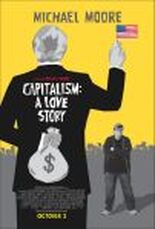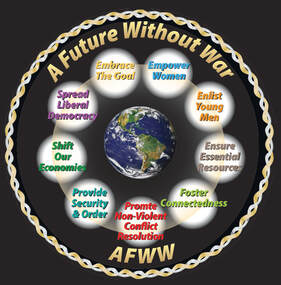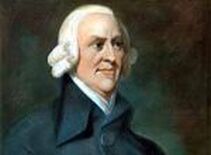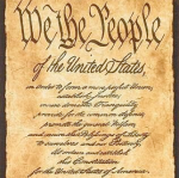- Home
-
Overview
- Study Guide
- The Single Most Important Idea
- Mission Statement
- War Is Not Inevitable keynote speech
- Capstone Essay: "To Abolish War"
- An Action Plan
- The Nine Cornerstones
- How Far We Have Already Come
- The Secret Ingredient
- The Vision Thing
- How Long It Will Take
- What You Can Do
- The AFWW Logo Explained
- Examples of War Expenses
- Biological Differences
- What Makes People Happy
- Map of Non-warring Cultures
- Cornerstones
- Videos
- Books
- Blog
- Project Enduring Peace
- About
- Related Projects
- Contact
 by Judith Hand. A Film Written, Produced, and Directed by Michael Moore Cutting to the bottom line immediately, my project AFWW urges that every citizen of the USA who loves the country and believes it still has the capacity to reclaim its democratic roots and liberating ideals needs to consider it a responsibility to see Michael Moore’s new film, “Capitalism: A Love Story“—maybe more than once, to ensure full understanding. One of AFWW’s nine cornerstones emphasizes that any campaign to end war must include the spreading of fully mature [i], liberal democracies and their preservation from degeneration.  AFWW Logo - 9 Cornerstones of a campaign to abolish war AFWW Logo - 9 Cornerstones of a campaign to abolish war Liberal democracies [ii] are the best means humans living at high densities have invented thus far to prevent leaders of any stripe from launching a war. The essay "Spread Liberal Democracy" explores why this is so, as does the book War and Sex and Human Destiny. Democracy alone, however, can’t prevent the success of war-mongering, as citizens of the United States who were persuaded to invade Iraq looking for weapons of mass destruction know all too well. Nevertheless, leaders who must answer to the people in order to stay in power are better restrained in a healthy, liberal democracy. Having said that, it must also be said that it’s unfortunate that the documentary film maker resorted, in order to make his case, to redefining capitalism. Moore’s essential message is that “capitalism” is evil. Not flawed, but evil. An evil that doesn’t need to be tweaked, but totally eliminated. Now the sad mess Moore so compellingly portrays is evil, if evil is defined as a system that slowly bleeds and crushes the masses in order to fatten the elite. If evil is defined as corruption of legislators so that they legislate in ways that enrich the elite at the expense of the common good.  Adam Smith Adam Smith Yes, THAT “capitalism” is evil. But what has evolved in the USA in the over 230 years since Adam Smith wrote about free markets is NOT capitalism. [iii] It is wildly unregulated capitalism. Moore at one brief point essentially concedes this when he names our system a plutonomy – basically a system in which 99% of the people work to provide vast riches to 1% of the people. When a proponent, in order to make his or her point, redefines a familiar word, one with a widely recognized meaning, the result tends to be confusion, not enlightenment. Capitalism, as described by Adam Smith and as originally embraced by the USA and as general understood by most folks, is in fact a great creator of wealth for the many and an incentive engine for creativity. [iii] Capitalism as originally conceived and properly regulated isn’t evil. Ask the many women around the world who have been granted microloans just how helpful a little capital can be. Or how vital it is to be able to own your own land (something forbidden to women in many countries). Moore would have been more accurate had he not faulted “capitalism” as the evil but the plutonomy that over time has replaced it.  Had Moore taken that tack, it would have been true and would more importantly have illustrated the phenomenon to which AFWW refers repeatedly: over time, any system of governing or economics that is run by males only will ultimately reflect characteristic human male urges for dominance, for the gathering of power into the hands of a few at the top. And the longer any male-only system persists, the deeper it sinks into the inequality that we all sense is inherently repugnant to our shared sense of fairness as human beings. What Moore urges at the end, with a stirring call to action, is that what Americans who are mad-as-hell-and-aren’t-going-to-take-this-any-more should do is to embrace “democracy.” Not democracy as the process of deciding political leaders, but democracy in the workplace. As used in the film, democracy represents conditions in which “the people” reclaim power and have a share in the ownership of the businesses they work in, businesses in which CEO’s and workers have a shared stake in the rewards of success…and the perils of failure. Moore’s depiction of the slow death of unions, which were a means to give people a voice in their workplaces, is masterful. His depiction of the accretion of power by Wall Street is clear and compelling. In this film, Moore seeks to reach hearts and minds with insight into the disaster that has happened to capitalism, and the dangers that this disastrous consolidation of power into the hands of the few poses for our democracy.  It’s clear how this should be important to U.S. citizens who love the USA’s founding ideals: that government should be of the people, by the people, and for the people so that they can pursue happiness. But how does all of this concern AFWW? How does this massive concentration of power in the hands of the few relate to AFWW’s mission to lay out a convincing case for the abolition of war? One of AFWW’s nine pillars, or cornerstones, of a strategy to create a warfare transition is that we must “Spread Liberal Democracy.” As already stated, democracy, when fully mature, is the single best means we have yet devised for curbing the ambitions of over-weaning war-mongers. [iv] Leaders determined to make war can override the will or good sense of the people, especially if those leaders control the flow of information, but in a democracy it is more difficult to gain and keep public support for a war. Most people, it turns out, don’t like to send their sons (and now daughters) off to fight and die elsewhere, so if given the choice to use other means to resolve conflicts, the people will choose other means. The significance for AFWW is that if our democracies do not survive and fully mature, if democratic rule does not spread globally—if ultimately the democracies fall by terrorist means, by social disintegration due to the ravages of climate change, by devolution into tyrannies, or by any unforeseen cause—one of the necessary pillars of abolishing war will collapse and our cause will fail. Rome fell. We dare not be complacent. Can this great nation “of the people, by the people, and for the people” reclaim that youthful and profound heritage, or will it continue to slip down the infamous “slippery slope” to imperialism and ultimately tyranny? “Capitalism: A Love Story” provides all of “the people” with a compelling and urgent wake-up call to action. [i] A “fully mature” democracy: one in which men and women are represented in roughly equal numbers in governing bodies and where all subsets of the population have a share in representation that is roughly proportional to their numbers. Length of existence is not the deciding factor for maturity.
[ii] “Liberal democracy”: voting alone will not produce a democracy able to restrain dominance-seeking males. People can freely elect illiberal, authoritarian leaders (Hitler’s Germany, Russia of 2000-2008). A liberal democracy must include many features, among them the rule of law protected by a constitution, independent and impartial courts, separation of state from religions, equality for all under the law, freedom of speech, and protection of property rights. [iii] Capitalism is an economic system characterized by private or corporate ownership of capital goods, by investments that are determined by private decision, and by prices, production, and the distribution of goods that are determined mainly by competition in a free market [iv] As of 2001, no democracies were yet fully mature; Sweden, with 42.7% of the representatives in their parliament being women and women in substantial numbers in other governing bodies, was perhaps coming closest (see data from the International Parliamentary Union) or go to the website of the Inter-parliamentary Union and follow the links for Women in Parliaments. The overwhelming majority of the world’ democracies remained light-years from full parity in governing.
0 Comments
Leave a Reply. |
Follow Me on Facebook
If you'd like to read my take on current affairs, or get a sense of what amuses me or I find educational or beautiful, do a search and follow me, Judith Hand, on Facebook. About the AuthorDr. Judith L. Hand. Dr. Hand earned her Ph.D. in biology from UCLA. Her studies included animal behavior and primatology. After completing a Smithsonian Post-doctoral Fellowship at the National Zoo in Washington, D.C., she returned to UCLA as a research associate and lecturer. Her undergraduate major was in cultural anthropology. She worked as a technician in neurophysiology laboratories at UCLA and the Max Planck Institute, in Munich, Germany. As a student of animal communication, she is the author of several books and scientific papers on the subject of social conflict resolution.
Categories
All
Archives
November 2019
|
A Future Without War
Believe in it. Envision it. Work for it.
And we will achieve it.
Believe in it. Envision it. Work for it.
And we will achieve it.
AFWW is continually developed and maintained by Writer and Evolutionary Biologist Dr. Judith Hand.
Earth image courtesy of the Image Science & Analysis Laboratory, NASA Johnson Space Center. Photo Number AS17-148-22727 eol.jsc.nasa.gov
©2005-2019 A Future Without War. All rights reserved. Login
Earth image courtesy of the Image Science & Analysis Laboratory, NASA Johnson Space Center. Photo Number AS17-148-22727 eol.jsc.nasa.gov
©2005-2019 A Future Without War. All rights reserved. Login
- Home
-
Overview
- Study Guide
- The Single Most Important Idea
- Mission Statement
- War Is Not Inevitable keynote speech
- Capstone Essay: "To Abolish War"
- An Action Plan
- The Nine Cornerstones
- How Far We Have Already Come
- The Secret Ingredient
- The Vision Thing
- How Long It Will Take
- What You Can Do
- The AFWW Logo Explained
- Examples of War Expenses
- Biological Differences
- What Makes People Happy
- Map of Non-warring Cultures
- Cornerstones
- Videos
- Books
- Blog
- Project Enduring Peace
- About
- Related Projects
- Contact


 RSS Feed
RSS Feed